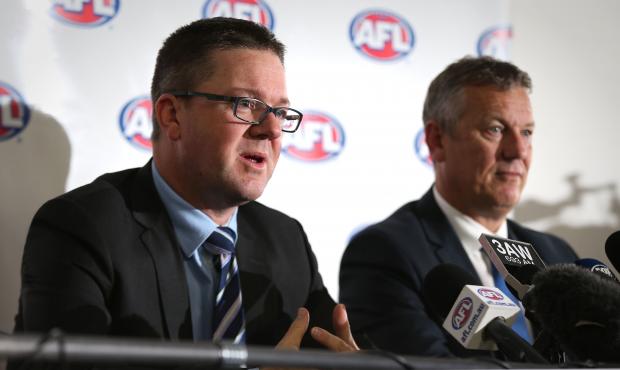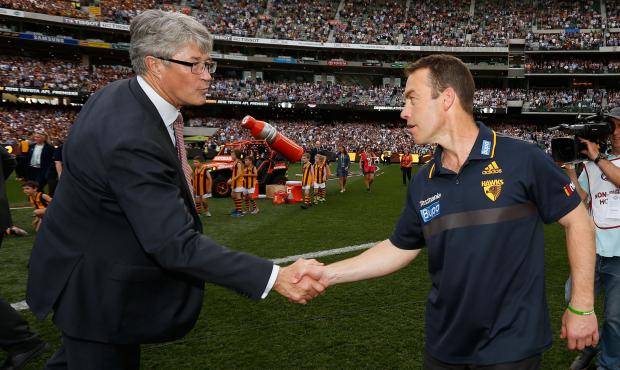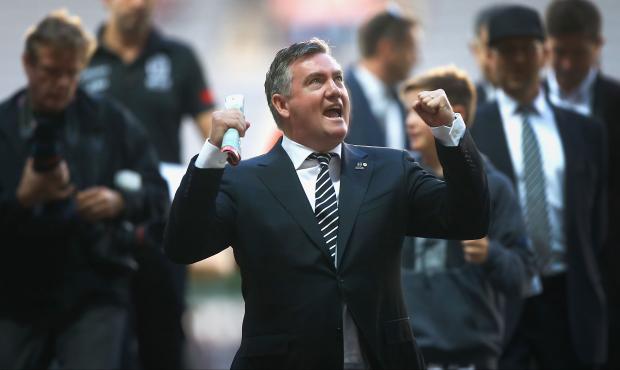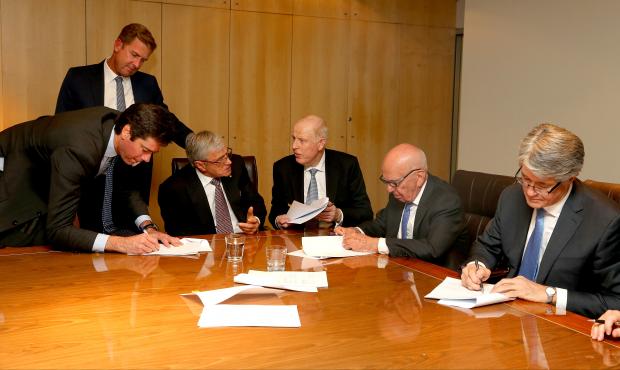Who are the people who shape the modern game? AFL.com.au, in conjunction with the AFL Record, is publishing Ashley Browne's 'movers and shapers' list.
Over the summer, AFL Media's Ashley Browne surveyed dozens of people from throughout the football industry – AFL and club officials, coaches, media members and others who work full-time in the game to come up with the most definitive ranking of those who shape the game as it is today.
More than 100 names were thrown up, but we have narrowed it down to the top 50. In some cases, football identities with common interests and causes were lumped in together, but the final rankings reflect a diverse range and the interest is not just in who made the final cut but where they are ranked.
The AFL's top 50 movers and shapers: 50-31
The AFL's top 50 movers and shapers: 30-11
Here are the top-10:
Born-again footy fan
10. RUPERT MURDOCH
News Corporation executive chairman
When asked in the mid-1990s why he was so determined to win a stake of rugby league's TV rights as opposed to those of the AFL, Rupert Murdoch said he just wasn't familiar enough with the indigenous football code to invest such large sums of money. It was a surprising admission from someone born in Melbourne, who attended Geelong Grammar and whose first newspaper purchase was the Adelaide News.
Nearly two decades later, Murdoch has significantly changed his tune. While seated alongside AFL Commission chairman Mike Fitzpatrick at the announcement of the AFL's $2.5 billion media rights deal, Murdoch said: "We've always believed that this is the premium code in Australia – it's the national game."
The cash from News (and the other media partners) will help the game prosper and grow and the deep commitment of News Corporation to the game, through Fox Footy and its newspapers, starting with the Herald Sun, cannot be questioned.
Keeper of the flame
9. KERRY STOKES
Seven West Holdings chairman
The ties between the Seven Network and football are so deep it is hard to believe that from 2002-06 the network lost the rights to the game.
One of Stokes' legacies is to ensure the game always remains part of the network's fabric and he has stumped up huge sums of money in three subsequent media deals to ensure his network holds the free-to-air rights.
"He has a very good understanding of the game and how it connects and binds," said one media industry figure. The AFL believes Seven generally does a good job of balancing its commercial interests with its historical connection to the game, which dates back to 1956.
It is also worth noting that Seven's chief executive Tim Worner and Melbourne managing director Lewis Martin play influential roles in making the partnership between the network and the game harmonious and mutually beneficial.
Wise counsel
8. GERARD WHATELEY
ABC broadcaster, AFL360 co-host
For six months of the year, Gerard Whateley is football's everywhere man. "He shapes the agenda and conversation around the game every day of the season," noted one club administrator.
With hosting duties on Fox Footy's AFL360 four days a week and ABC TV's Offsiders on Sunday mornings, and Friday night and Saturday afternoon match-calling on ABC Grandstand, Whateley brings broadsheet sensibilities to a game that can so easily veer into the banal.
Whateley has clear lines of communication into the executive offices of the AFL where he is regarded as a sounding board and he is a handy advocate for the game in the corridors of the Sydney-centric ABC. He was reportedly close to outgoing ABC boss Mark Scott and it is to be hoped he forges a similarly tight bond with his replacement, Elizabeth Guthrie.
But lest you think Whateley takes things too seriously, the fanatical Geelong supporter bounded on to the stage at the club's season launch last month with the No.35 taped to the back of his suit to honour the incoming superstar Patrick Dangerfield.
The negotiator
7. PAUL MARSH
AFL Players' Association chief executive
In the 12 months or so since swapping the creams (he was formerly the chief executive of the Australian Cricketers' Association) for footy boots, the Essendon affair has taken up much of his time. And understandably so.
But now Marsh will start earning his money as he navigates the AFLPA through the next collective bargaining agreement with the AFL. "His status rests on his capacity to deliver the next CBA," said one source, while another said the final deal would be the making – or breaking — of Marsh in that role.
Marsh has already flagged the players will be seeking a set percentage of AFL revenues, a position the League rejected during the last negotiation and which influential figures such as Eddie McGuire are already agitating against this time around. It sets the scene for a heated negotiation, one that will be an interesting diversion throughout the coming season.
Paul Marsh and Mark Evans addressing the media. Picture: AFL Media
Right man, right time
6. MARK EVANS
AFL general manager football operations
The AFL set out on a quest to lure more executives with club backgrounds into the organisation and after three years the decision to bring Mark Evans from Hawthorn is seen as a winner by pretty much everyone in the game.
Moves such as tweaking the Match Review Panel and this year's reduction to 90 interchange rotations and no substitutes were introduced without fuss and rancor because Evans listened closely and consulted widely before making such changes.
"The clubs don't whinge any more because they feel they get listened to," said one colleague, who described him as the voice of reason on the AFL executive. "He has a vision for how the game should be played and takes people with him," said another observer.
Football's first lady
5. CAROLINE WILSON
The Age journalist, 3AW, Channel Nine and ABC broadcaster
It speaks volumes that Caroline Wilson's brand as a journalist and commentator has grown even though her primary employer – Fairfax Media – is shedding print circulation at an alarming rate. Be it The Age, 3AW, Footy Classified or Offsiders, people pay attention.
"She's still the bluntest instrument in opinion-making," said one observer. "She looks for the story and is fearless in reporting it."
Wilson has been a trailblazer for women in football and in that respect is an inspiration to many. But more to the point, she is an outstanding journalist in every facet, both with her reporting and commentary.
Wilson was at her best during the Essendon saga – relentlessly pursuing the story and holding the key officials at every level to account for their actions and words.
Pocket genius
4. ALASTAIR CLARKSON
Hawthorn senior coach
With premierships comes status and authority and Clarkson now has four of them to his name, including the past three.
With his clusters, his brilliant player trading and emphasis on leadership, skill acquisition and development, he has made Hawthorn the best club in the AFL on and off the ground and shaped the AFL coaching landscape to the point where five of his former lieutenants – Damien Hardwick, Leon Cameron, Luke Beveridge, Adam Simpson and Brendon Bolton — have become senior coaches at other clubs.
Clarkson is the Kevin Sheedy of the time, a relentless salesman of the game. He will travel to the ends of the earth to find that winning edge for the Hawks and to help grow the game.
Clarkson (with some help from Ross Lyon) has remodelled the AFL Coaches Association, helped revive the International Rules Series and has the ear of everyone at the AFL.
No visit to League headquarters at Docklands is complete without Clarkson walking the corridors, bending the ear of the key executives. "His is the voice of authority when it comes to on-field matters," said one club administrator.
Mike Fiztpatrick and Alastair CLarkson shake hands after the Grand Final. Picture: AFL Media
A football man
3. MIKE FITZPATRICK
AFL Commission chairman
Mike Fitzpatrick's football gravitas is clear. He is a three-time Carlton premiership ruckman, including two as captain, and when it comes to the aesthetics of the game, he is guided by this celebrated era, which was pretty much defined by having 18 individual one-on-one battles all over the ground.
This might explain his disdain for the high number of interchange rotations. He is known to have made his feelings clear about this over the years to those in the football department at the AFL and it may have been a catalyst for the reduced interchanges we are seeing now. "Let the players play," is his usual retort when asked about the on-field product.
But on most matters to do with the game, Fitzpatrick is across everything.
A Rhodes Scholar who studied at Oxford, he became one of Australia's most successful fund managers. When it comes to the AFL, he probes and asks lots of questions but leaves the heavy lifting to the League's senior management. For instance, he was well briefed on last year's negotiations for the new media rights deal and was present for some of the negotiating sessions that stretched out until well past midnight, but more in an advisory and support role.
He is not universally beloved in club circles and his dressing down of then Sydney Swans chairman Richard Colless in 2013 after the Swans signed Lance Franklin was well reported.
Fitzpatrick has been Commission chairman since 2007 and some are speculating this will be his last year in the position. But the position alone dictates he is a person of influence.
Eddie everywhere
2. EDDIE McGUIRE
Collingwood president, Triple M breakfast radio host, Fox Footy caller and presenter
There are those who believe Eddie McGuire's standing in the game is on the wane. For all its financial might, Collingwood these days is no bigger than other behemoths such as Hawthorn and West Coast.
On the field, the Pies have been a middle-of-the-road side, having not made the finals the past two years and not having won in September since 2012.
And rather than host The Footy Show with its TV audience approaching a million viewers each Thursday night, he instead fronts Friday night football and calls weekend games for Fox Footy.
But then you think about a sleepy Friday morning last January when half the population was at the beach and the rest at the Australian Open. McGuire used his morning radio show to float a radical overhaul of the NAB Challenge and for the next 48 hours it was football and not a grand slam tennis tournament being played in its own backyard that dominated the back pages and the talkback radio lines in Melbourne.
Two months later, he was at it again, commanding all the headlines with a bold plan to replace Etihad Stadium with a new 60,000-seat stadium across the train tracks from the MCG.
Both examples provided ample proof that, after all these years, McGuire's ability to push an agenda remains unsurpassed and, as long as he can continue to juggle his Collingwood and media roles, it will remain so.
Eddie McGuire celebrates a Collingwood win. Picture: AFL Media
The dealmaker
1. GILLON McLACHLAN
AFL chief executive
Chief executives are often judged by the totality of their work and towards the end of their tenures. McLachlan has been in the big chair for less than two years, but has already struck his first big deal – the six-year, $2.5 billion media rights deal that will kick into gear next year. It was widely regarded as a coup for the AFL as it moved swiftly to tie up all its prime media assets – free-to-air, pay TV and digital – in one fell swoop while its main rival (the NRL) was left floundering.
The next thing is how he chooses to spend it and this should define his term at the helm of Australia's national game. The players are talking about receiving a set percentage of revenues, game development needs investment, fans and clubs need nurturing, a national women's competition is set to start and Etihad Stadium might belong to the AFL soon. He wants the game to be able to afford the best people – on and off the ground – and to attract as many people as possible to the game, at the ground, watching on TV and digital platforms.
He is consulting widely as he shapes the game's future. "Gill is really smart," said one senior executive at AFL House. "He gets things really quickly and you can never be half-prepared when you see him because he has a really quick grasp of the issues."
A mantra of McLachlan's predecessor, Andrew Demetriou, was that all the people cannot be pleased all the time, but you can aim to please most of them most of the time. McLachlan is smart enough to use the same philosophy as he gets about carving up a rich and juicy pie.
Gillon McLachlan signs the record-breaking media rights deal. Picture: AFL Media


